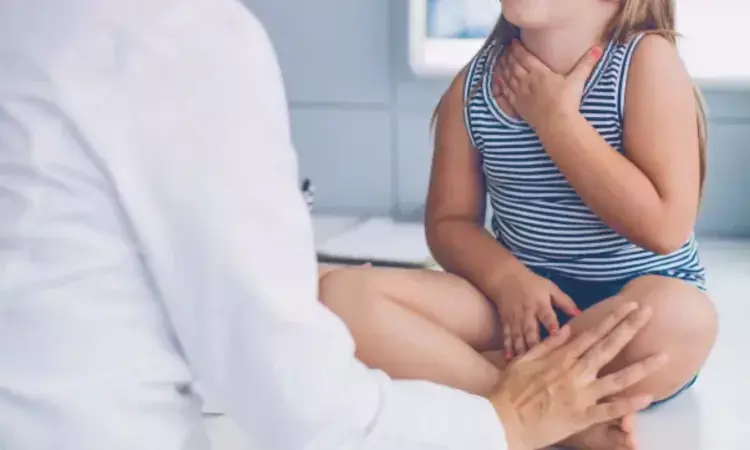- Home
- Medical news & Guidelines
- Anesthesiology
- Cardiology and CTVS
- Critical Care
- Dentistry
- Dermatology
- Diabetes and Endocrinology
- ENT
- Gastroenterology
- Medicine
- Nephrology
- Neurology
- Obstretics-Gynaecology
- Oncology
- Ophthalmology
- Orthopaedics
- Pediatrics-Neonatology
- Psychiatry
- Pulmonology
- Radiology
- Surgery
- Urology
- Laboratory Medicine
- Diet
- Nursing
- Paramedical
- Physiotherapy
- Health news
- Fact Check
- Bone Health Fact Check
- Brain Health Fact Check
- Cancer Related Fact Check
- Child Care Fact Check
- Dental and oral health fact check
- Diabetes and metabolic health fact check
- Diet and Nutrition Fact Check
- Eye and ENT Care Fact Check
- Fitness fact check
- Gut health fact check
- Heart health fact check
- Kidney health fact check
- Medical education fact check
- Men's health fact check
- Respiratory fact check
- Skin and hair care fact check
- Vaccine and Immunization fact check
- Women's health fact check
- AYUSH
- State News
- Andaman and Nicobar Islands
- Andhra Pradesh
- Arunachal Pradesh
- Assam
- Bihar
- Chandigarh
- Chattisgarh
- Dadra and Nagar Haveli
- Daman and Diu
- Delhi
- Goa
- Gujarat
- Haryana
- Himachal Pradesh
- Jammu & Kashmir
- Jharkhand
- Karnataka
- Kerala
- Ladakh
- Lakshadweep
- Madhya Pradesh
- Maharashtra
- Manipur
- Meghalaya
- Mizoram
- Nagaland
- Odisha
- Puducherry
- Punjab
- Rajasthan
- Sikkim
- Tamil Nadu
- Telangana
- Tripura
- Uttar Pradesh
- Uttrakhand
- West Bengal
- Medical Education
- Industry
Girls and children with family history of AITD more likely to develop Thyroid autoantibodies in early life: Study

Sweden: A recent study has revealed that thyroid autoantibodies can develop in the first few years of life, particularly in girls and children with a family history of autoimmune thyroid disease (AITD).
The concurrent presence of both types of autoantibodies raises the risk of developing hypo- or hyperthyroidism, the study stated.
"Our results, in this cohort of children with genetic risk of type 1 diabetes (T1D), demonstrate that even at an early age, the risk for girls was more than twice that of boys," Berglind Jonsdottir, Department of Clinical Sciences, Malmö, Lund University, Lund, Sweden, and colleagues reported in The Journal of Clinical Endocrinology & Metabolism.
"The association between thyroid autoimmunity and sex in our young cohort is significant, especially since previous studies indicated that the sex difference in autoimmune thyroid disease (AITD) was less pronounced in prepubertal children."
Autoantibodies to thyroglobulin (TgAb) and thyroid peroxidase (TPOAb) define pre-clinical autoimmune thyroid disease, which can progress to clinical hypo- or hyperthyroidism. Dr. Jonsdottir and colleagues determined the age at seroconversion in children genetically at risk for type 1 diabetes.
For this purpose, they determined TPOAb and TgAb seropositivity in 5066 healthy children with HLA DR3 or DR4 containing haplogenotypes from The Environmental Determinants of Diabetes in the Young (TEDDY) Study. Children who tested positive on the initial cross-sectional screening at ages 8 to 13 had longitudinal samples collected as early as 3.5 months. These samples were analyzed retrospectively and prospectively for thyroid autoantibodies to determine the age of seroconversion. First-appearing autoantibody was related to sex, family history of AITD, HLA genotype, and subsequent thyroid dysfunction and disease.
The study led to the following findings:
- The youngest appearance of TPOAb and TgAb was 10 and 15 months of age, respectively. Girls had higher incidence rates of both autoantibodies.
- A family history of AITD was associated with a higher risk of TPOAb hazard ratio [HR] 1.90, and TgAb HR 2.55.
- There was no difference in the risk of progressing to hypo- or hyperthyroidism between TgAb and TPOAb, however, children with both autoantibodies appearing at the same visit had a higher risk than TPOAb appearing first (HR 6.34).
"Our investigation found that thyroid autoimmunity may be triggered in younger children than previously recognized. Additionally, the presence of double positivity at seroconversion indicated the highest risk of developing clinical thyroid disease in an HLA-selected population. It is important to further explore the underlying factors contributing to the onset of thyroid autoimmunity," the researchers concluded.
Reference:
Berglind Jonsdottir, Joanna L Clasen, Kendra Vehik, Åke Lernmark, Markus Lundgren, Ezio Bonifacio, Desmond Schatz, Anette-Gabriele Ziegler, William Hagopian, Marian Rewers, Richard McIndoe, Jorma Toppari, Jeffrey Krischer, Beena Akolkar, Andrea Steck, Riitta Veijola, Michael J Haller, Helena Elding Larsson, the TEDDY Study Group, Early appearance of thyroid autoimmunity in children followed from birth for type 1 diabetes risk, The Journal of Clinical Endocrinology & Metabolism, 2024; dgae478, https://doi.org/10.1210/clinem/dgae478
Dr Kamal Kant Kohli-MBBS, DTCD- a chest specialist with more than 30 years of practice and a flair for writing clinical articles, Dr Kamal Kant Kohli joined Medical Dialogues as a Chief Editor of Medical News. Besides writing articles, as an editor, he proofreads and verifies all the medical content published on Medical Dialogues including those coming from journals, studies,medical conferences,guidelines etc. Email: drkohli@medicaldialogues.in. Contact no. 011-43720751


